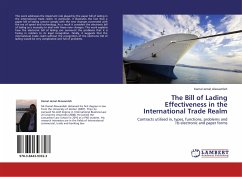This work addresses the important role played by the paper bill of lading in the international trade realm. In particular, it illustrates the fact that a paper bill of lading cannot comply with the new changes connected with the era of speed and technology. As a result it considers the electronic bill of lading as a necessity to deal with these new changes. This work explains how the electronic bill of lading can surmount the problems that it is facing in relation to its legal recognition. Finally, it suggests that the international trade realm without the recognition of the electronic bill of lading would be very complicated and full of problems.








